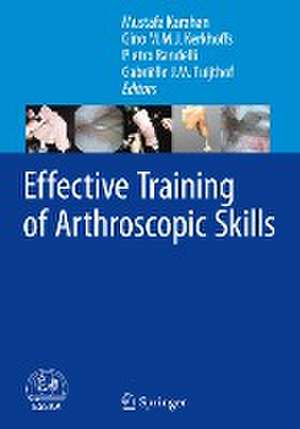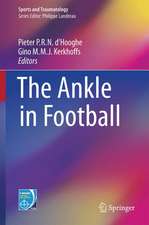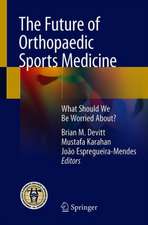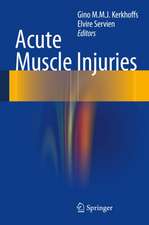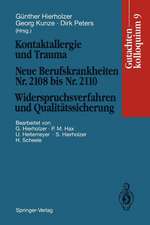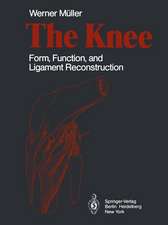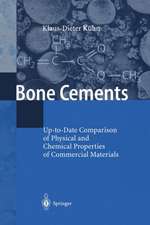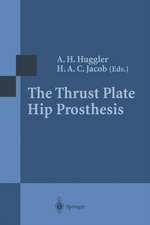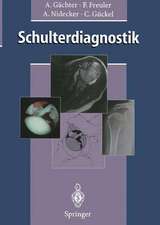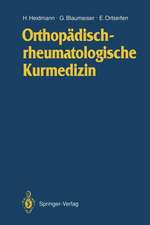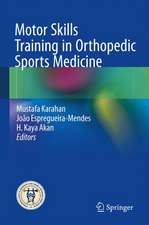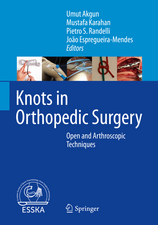Effective Training of Arthroscopic Skills
Editat de Mustafa Karahan, Gino M.M.J. Kerkhoffs, Gabriëlle J.M. Tuijthofen Limba Engleză Hardback – 19 dec 2014
Preț: 353.87 lei
Preț vechi: 372.50 lei
-5% Nou
Puncte Express: 531
Preț estimativ în valută:
67.72€ • 72.41$ • 56.46£
67.72€ • 72.41$ • 56.46£
Carte tipărită la comandă
Livrare economică 14-19 aprilie
Preluare comenzi: 021 569.72.76
Specificații
ISBN-13: 9783662449424
ISBN-10: 3662449420
Pagini: 160
Ilustrații: X, 173 p. 55 illus., 30 illus. in color.
Dimensiuni: 178 x 254 x 17 mm
Greutate: 0.57 kg
Ediția:2015
Editura: Springer Berlin, Heidelberg
Colecția Springer
Locul publicării:Berlin, Heidelberg, Germany
ISBN-10: 3662449420
Pagini: 160
Ilustrații: X, 173 p. 55 illus., 30 illus. in color.
Dimensiuni: 178 x 254 x 17 mm
Greutate: 0.57 kg
Ediția:2015
Editura: Springer Berlin, Heidelberg
Colecția Springer
Locul publicării:Berlin, Heidelberg, Germany
Public țintă
Professional/practitionerCuprins
Obstacles faced in the classical training system; Why is there a need for newer systems?- Needs and wishes from the arthroscopic community? Simulation: Traditional wet labs (animal and human cadavers) including industry involvement.- Box trainers & anatomic bench models.- Virtual reality simulators.- Simulator Validation.- Guidelines for use of simulators. Objective performance tracking: Psychomotor learning applied to arthroscopy.- What measures represent performance?- What thresholds are evidence-based?- Preclinical training strategies.- Guidelines for preclinical performance tracking. Monitoring training in the OR: Theory on learning strategies applied to arthroscopy.- Global rating scales.- (Video) tools for objective monitoring in OR.- Guidelines for use in OR.- Concluding remarks.
Notă biografică
Mustafa Karahan, MD, was appointed Professor in the Department of Orthopaedics and Traumatology, Acıbadem University School of Medicine, Istanbul, Turkey in 2012. His other appointments include Consultant, Sports Sciences and Sports Health Research and Application Center, Marmara University, Istanbul; Director, Motor Skills Development Laboratory, Marmara University; and Visiting Professor, Boğaziçi University Biomedical Institute. He is a member of the ESSKA Education Committee and the ISAKOS Education and Scholarship Committee. Dr. Karahan is an editorial board member of the American Journal of Sports Medicine and Knee Surgery, Sports Traumatology, Arthroscopy. He has published more than 100 journal publications and presented over 200 national and international presentations and lectures.
Pietro S. Randelli, MD, is Research Professor in the Department of Orthopaedics, University of Milan (Università degli Studi) and Chief of the 2nd Department of Orthopaedics, Dipartimento di Scienze Biomediche per la Salute, IRCCS Policlinico San Donato, Milan, Italy. Dr. Randelli is an Executive Board Member and Chairman of the Education and Fellowship Committee of ESSKA (2012-2014) and Second Vice-President of the Italian Society of Knee Surgery, Arthroscopy, and Sports Traumatology, of which he was a founding member. He is also a Past-President of the Magellan Society and in 2005 became an Honorary Member of the American Orthopaedic Society for Sports Medicine. He has surgical experience of more than 4000 procedures and is the author of almost 250 publications.
Gabriëlle Josephine Maria Tuijthof, MSc, PhD, is Associate Professor in the Department of Biomechanical Engineering, Delft University of Technology, Delft, the Netherlands. She obtained her doctorate in 2003 for a thesis on the technical improvement of arthroscopic techniques and her research has since focused on the optimization of surgical performance in orthopaedics by thedevelopment of innovative devices, software, and training facilities. Her contributions range from the quantification of performance measurement and the development of simulated clinical environments for training, to the provision of innovative engineering solutions that bridge the gap between fundamental research and clinical application. Dr. Tuijthof has published more than 40 journal papers She is a board member of the Dutch Society for Simulation in Healthcare and a member of the ESSKA Education Committee.
Pietro S. Randelli, MD, is Research Professor in the Department of Orthopaedics, University of Milan (Università degli Studi) and Chief of the 2nd Department of Orthopaedics, Dipartimento di Scienze Biomediche per la Salute, IRCCS Policlinico San Donato, Milan, Italy. Dr. Randelli is an Executive Board Member and Chairman of the Education and Fellowship Committee of ESSKA (2012-2014) and Second Vice-President of the Italian Society of Knee Surgery, Arthroscopy, and Sports Traumatology, of which he was a founding member. He is also a Past-President of the Magellan Society and in 2005 became an Honorary Member of the American Orthopaedic Society for Sports Medicine. He has surgical experience of more than 4000 procedures and is the author of almost 250 publications.
Gabriëlle Josephine Maria Tuijthof, MSc, PhD, is Associate Professor in the Department of Biomechanical Engineering, Delft University of Technology, Delft, the Netherlands. She obtained her doctorate in 2003 for a thesis on the technical improvement of arthroscopic techniques and her research has since focused on the optimization of surgical performance in orthopaedics by thedevelopment of innovative devices, software, and training facilities. Her contributions range from the quantification of performance measurement and the development of simulated clinical environments for training, to the provision of innovative engineering solutions that bridge the gap between fundamental research and clinical application. Dr. Tuijthof has published more than 40 journal papers She is a board member of the Dutch Society for Simulation in Healthcare and a member of the ESSKA Education Committee.
Textul de pe ultima copertă
This book explains how training in arthroscopic skills is best carried out in order to keep up to date with advances in arthroscopy, meet the ever-increasing demand for high-quality care, and respond to changes in available training time. State of the art developments regarding tools, performance monitoring, and learning strategies are presented, and practical guidelines provided for direct implementation in daily clinical practice. The coverage of simulation-based training ranges from the use of wet labs and box trainers through to sophisticated virtual reality simulators. Subsequent sections on objective performance tracking of training outside and in the operating room cover a variety of key aspects, including psychomotor learning, the adequacy of performance measures, evidence-based thresholds, preclinical training strategies, the role of global rating scales, and video tools.
As a result of the success of arthroscopy, its role in the orthopaedic armamentarium is continuously increasing and ever more complex surgeries are being performed arthroscopically. Effective training in arthroscopy is essential to good outcomes. The guidance provided in this book by acknowledged experts in the field will assist in improving the efficiency and effectiveness of arthroscopic training and in enhancing patient safety.
As a result of the success of arthroscopy, its role in the orthopaedic armamentarium is continuously increasing and ever more complex surgeries are being performed arthroscopically. Effective training in arthroscopy is essential to good outcomes. The guidance provided in this book by acknowledged experts in the field will assist in improving the efficiency and effectiveness of arthroscopic training and in enhancing patient safety.
Caracteristici
Provides evidence-based guidelines that will help the reader to effectively implement new training tools Describes training strategies directly applicable in clinical practice Written by acknowledged world experts in the topics discussed
